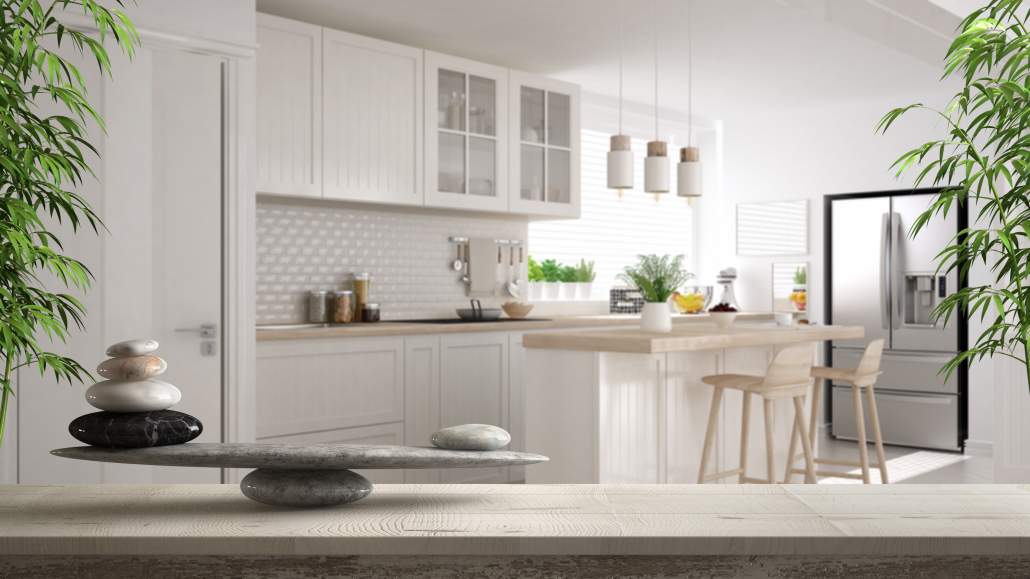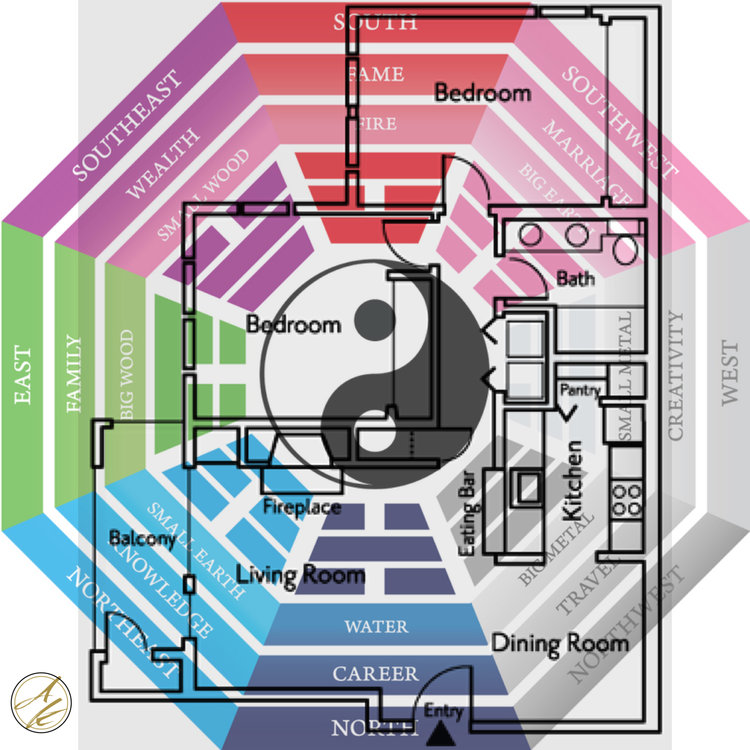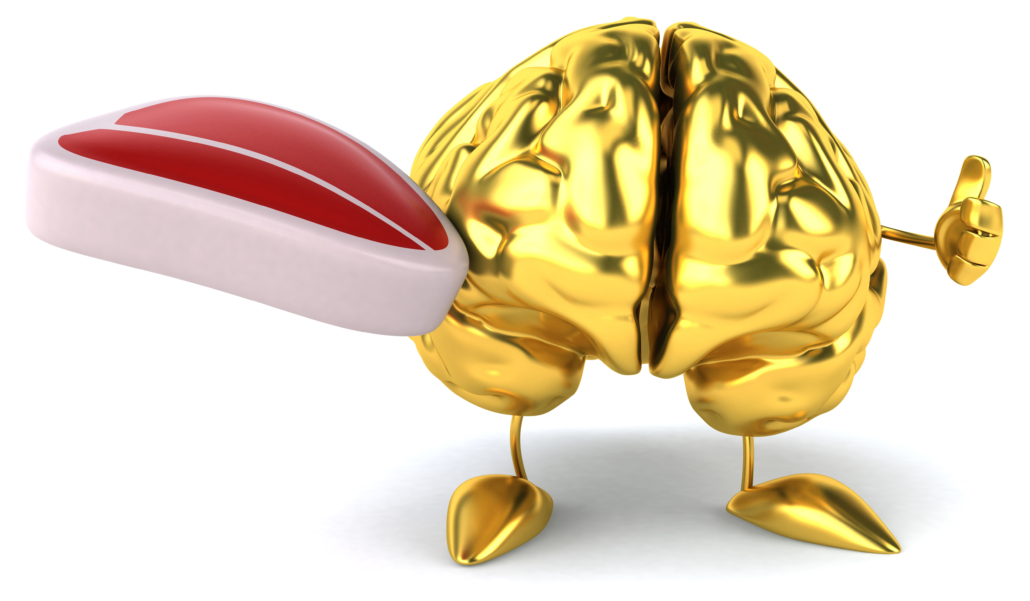We include products in articles we think are useful for our readers. If you buy products or services through links on our website, we may earn a small commission.
Feng Shui Rules: A Beginner’s Guide

Table of Contents
This beginner’s guide to Feng Shui rules can help you improve your life by changing your living environment.
Though dating back thousands of years, these Feng Shui rules will give you fresh ways to uplift your mood, enhance your physical health, and transform your life by artfully re-arranging your living spaces.
What Is Feng Shui?
Feng Shui is an ancient Chinese art of arranging objects and space in an environment to achieve harmony and balance. In Chinese “Feng” means “wind” and “Shui” means “water.” Its origins can be traced back to an ancient poem describing the feeling of being in harmony with nature.
The winds are mild,
The sun is bright,
The water is clear,
The trees are lush.
It’s this sense of perfect harmonious connection with nature that Feng Shui aims to achieve in all of your surroundings.
Feng Shui philosophy is closely related to Taoism. “Tao” means “the way” and Taoism refers to the “way of nature”. When we practice feng shui rules, we are essentially creating the feeling of being connected with nature through our built environments.
For 6000 years Feng Shui rules guided the design of temples and ancient structures including the Great Wall of China. Today Feng Shui is still a serious part of Chinese culture. In 2019 a Chinese court ordered a media company to pay $30,000 to a developer after it published an article stating that it broke ancient rules of feng shui and would bring misfortune to its occupants.
If the philosophy behind Feng Shui–and how seriously it’s taken–isn’t enough to convenience you to launch into a home makeover, maybe you’ll be motivated by the ways Feng Shui promotes:
- better sleep
- better mental health
- better productivity
- better overall health
Though Feng Shui is more of ancient art than hard science, studies have found that the bedroom layout used in feng shui can contribute to better sleep. Another study looking at highly-stressed healthcare workers found that using feng shui rules at a hospital helped to improve the emotional well-being of nurses.
Essential Principles of Feng Shui
One of the reasons there are so few studies on Feng Shui, is because of the mysterious, and unquantifiable role of “Chi” (or “Qi”).
In Chinese philosophy, Chi is the positive energy that we want to cultivate in the spaces where we live, work, and play. As you might imagine, it’s pretty tough to pin down a positive spiritual energy with scientific tools.
It’s helpful to think of chi as that feeling of invigoration, awakeness, and pleasure you get from spending time in certain spaces. For these feelings to arise Chi needs to be freely circulating in a space. Feng Shui seeks to enhance those feelings by helping Chi flow.
To increase the flow of chi while minimizing chi blockages (sha chi), the goal is to bring the five elements–water, earth, fire, metal, and wood– into balance with each other.
These rules will help you identify and enhance the positive feelings you get from the spaces you live in.
The Commanding Position
If you’re in a room, the commanding position is located at the furthest diagonal spot from the door. From this spot, you should be able to see the door clearly. According to feng shui, this is a dominant place, and therefore the area where you should spend the most time.
Each room has a commanding position. If it’s your bedroom you should place your bed there. If it’s your office, this is the spot for your desk. In your kitchen, this is a great spot for your stove.
These feng shui rules are not random suggestions. Your bed represents you. Your desk is the extension of your career. Your stove stands for nourishment and wealth. These are all important aspects of your life and deserve to be respected by inhabiting a commanding position in space.
The Bagua
The Bagua is the feng shui energy map for your space. Bagua means “eight areas”. Each refers to a “gua” or key area of your life.
The Baguas:
- Family
- Wealth
- Health
- Children
- Knowledge
- Fame
- Career
- Partnerships
Each area has specific shapes, colors, seasons, numbers, and earthly elements assigned to them. You can use the Bagua to analyze your home and find out what areas are the most aligned with certain aspects of your life.
To use a Bagua map you’ll need a floor plan of your home, office, or room and a compass. You divide the floorplan of your home into 9 equal squares then overlay the map. Each square corresponds to the 8 areas, with the 9th–the Yin Yang point–being the heart of the home that energetically connects to all the other areas.

Sourced from Albie Knows
The Five Elements
The Feng Shui five elements include earth, metal, water, wood, and fire. These elements represent different phases of your life and they’re all interrelated. The aim of Feng Shui is to balance these elements in your home and your life.
While you work with the five elements, consider how you want them to appear in your life. What areas do you want to focus on? What areas are important to you? What do you need to strengthen? What areas have you been overfocusing on to the detriment of others?
Earth
- Qualities: grounded, stable, self-caring
- Shape: flat, square
- Colors: brown, yellow, orange
- Season: in transition, between seasons
- Areas: health, partnerships, knowledge
Metal
- Qualities: efficient, beautiful, precise
- Shape: circular, spherical
- Colors: white, metallics
- Season: fall
- Areas: children, helpful people
Water
- Qualities: flowing, shifting, downward
- Shape: wavy, curvy
- Colors: black
- Season: winter
- Area: career
Wood
- Qualities: vitality, expansive, upward
- Shape: rectangular, columnar
- Colors: green, blues
- Season: spring
- Areas: wealth, family
Fire
- Qualities: passion, brilliant, illuminating
- Shape: pointy, triangular
- Colors: red
- Season: summer
- Area: fame
Room by Room Tips
Now that you understand the essential principles and the five elements of feng shui you’re ready to put these feng shui rules into practice.
Entry
The entry to your home is where the energy (qi) first enters. No wonder, it’s also referred to as the “mouth of qi”. Since this is the space that others look into and can see from outside, it also represents your face.
Make sure that your front door is easy to identify. Keep your entry clean, free of clutter, and easy to navigate.
Living Room
This is where you gather with your family and friends. The sofa, armchairs, and chairs should face each other to invite conversation and connection.
The backs of the chairs should not face the door. Have some extra seats for unexpected guests. This is a great space for green plants that bring in the wood element, life force, compassion, and kindness.
If you have art in the living room, make sure to hang it at eye level, and not too low. Chose art that is not emotionally charged since this is a communal room. Often we keep art from exes that carry heartache. Feng Shui is about clearing and balancing the mind by clearing space.
Keep the windows clean to enhance your experience of clear perception when it comes to social interactions. Open the windows for at least 9 minutes every day to let the air clear space.
Kitchen
Your kitchen is a place to cook, eat, and gather. In feng shui, the kitchen represents nourishment, so it’s important to keep the kitchen decluttered and intentional, signaling to yourself and your family the qualities that you want to feed them with.
Pay particular attention to your fridge. A cluttered fridge often corresponds to a cluttered mind. Compost, recycle or discard anything that’s expired or no longer useful. Notice how good it feels to clear away things that we’ve been avoiding. See if you can bring that same clearing to other areas of your life.
Use non-toxic cleaners. Fix or discard any broken kitchen appliances. Make sure that every food item is healthy and chosen with intention. Adding a clean quartz crystal to your fridge can amplify the bright, nourishing, and positive qi.
Bathroom
The bathroom is where we come to cleanse and purify our bodies, so it’s important to treat your bathroom as you’d like to treat your body–by paying attention to the details and keeping it clean–deep clean!
Declutter products around your sink. Toss away anything with an expired shelf-life. Replace your towels often since they accumulate bacteria. Clean with non-toxic products.
Water represents the flow of wealth and money. You don’t want your money to flow away, so conserving water and closing your toilet seat and bathroom door will all help keep the Chi from going down the drain.
Bedroom
Feng shui rules link your bedroom with your health. Your bedroom is a sanctuary of safety, rest, and rejuvenation.
The colors and materials should reflect these qualities. For example, earthy-toned rugs, pottery, and crystals can create a calming, stress-reducing atmosphere. Reducing stress is shown to have tremendous positive effects on mental and physical health.
Your bed should be in a commanding position to affirm the commanding position you want to experience in your own life.
Avoid storing anything under your bed. Clutter there can be associated with unconscious blockages, compulsions, and parts of your life that you’re avoiding or have a hard time letting go of. Luggage and shoes can signal to the unconscious an unsettling sense of being always on the move. Letters or pictures from an ex–well, we’ll leave that for you to figure out.
Feng Shui: Mistakes to Avoid
When following feng shui rules in your home, here are some of the most common mistakes and how to avoid them.
A Bed on the Same Wall as the Door
All you need is a comfy bed… Not quite. Placement is important. Never put the bed on the same wall as your door. This can create a persistent sense of coming and going that interferes with the resting and receiving the energy of a commanding position. Your feet should also never face the door while sleeping or resting.
Make sure that there is a solid wall behind your bed to provide stability. And the bed should not be placed against a wall behind which is a toilet or kitchen. Nor should it be facing the bathroom door. Sleeping under a beam or a slope can amplify the sense of pressure and stress in your life.
A Raised Toilet Lid
Up or down? It’s a common source of disagreements among couples. Feng shui has the answer. Your toilet and drains in your bathroom can represent energy draining from your life, so keep them shut. And keep your bathroom door closed.
Mirrors
Forget about vanity! Mirrors have their role in feng shui. While they can certainly create a feeling of spaciousness, especially in smaller rooms, it’s important not to overuse them. Following feng shui rules, you can use mirrors but do not in every room.
Place your mirror strategically. Put one in your dining room to reflect the abundance of food. Use them in open spaces. Avoid mirrors in your bedroom or on your bathroom door. Remove any broken mirrors that can create a sense of fragmentation and disharmony.
Clutter
It may sound obvious that a home cluttered with boxes, toys, newspapers, and other unwanted things is not inviting for your family and guests. It can also be emotionally draining.
Take it from the queen of decluttering, Marie Kondo who writes, “When you put your house in order, you put your affairs and your past in order, too. As a result, you can see quite clearly what you need in life and what you don’t, and what you should and shouldn’t do.”
Studies show that tidiness, or the lack of it, can affect your emotions and productivity. In one study women who described their homes in more stressful terms like messy, cluttered, disarrayed, unorganized, disorganized, overflowing, chaotic, half-finished or sloppy showed cortisol levels that correspond with more stress and poorer physical wellbeing.
In this same study, women who described their homes with terms like relaxing, restful, calming, comforting, soothing, serene, pleasurable, quiet, homey, or peaceful had cortisol fluctuations indicating greater psychological and physical well-being.
Another study looking at the association between clutter and procrastination found that ineffective use of one’s living space; feeling overwhelmed, depressed and worried by excessive stuff was associated with procrastination.
Feng Shui Rules: The Takeaway
These ancient Feng Shui rules can help you create a sense of harmony, energy, and balance in the spaces where you live and work.
Though more of an art than hard science, Feng Shui’s principle of the interconnection between space and all of your life experiences can bring you into greater awareness and appreciation of important parts of life including, family, prosperity, health, and relationship.
The intentional changes that Feng Shui brings into your living spaces create a sense of wellbeing and are shown to have positive effects on sleep, productivity, and health.















